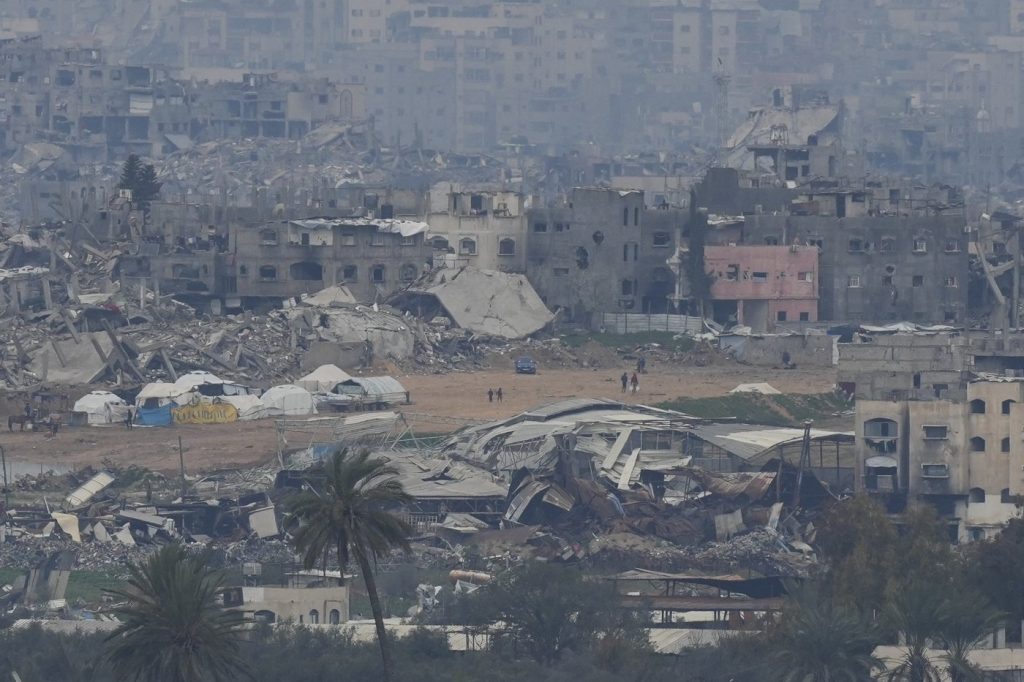MUGHRAQA, Gaza Strip – Israeli forces initiated their withdrawal from a crucial Gaza corridor on Sunday, per statements from Israeli officials. This move is part of the commitments made under a fragile ceasefire deal with Hamas, which is progressing but is facing notable hurdles regarding the negotiation of its planned extension.
As part of the recent truce, Israel agreed to withdraw its troops from the 4-mile (6-kilometer) Netzarim corridor, a significant strip of land that connects northern Gaza to the south. Throughout the conflict, this corridor was utilized by Israel as a military zone. Following the ceasefire's implementation last month, Israel allowed Palestinians to traverse the Netzarim area, facilitating their return to homes located in the war-torn northern regions. This led to hundreds of thousands of individuals moving across Gaza, both on foot and by vehicle. The ongoing troop withdrawal signifies another essential commitment to the ceasefire agreement, which has temporarily halted the 15-month-long conflict.
Despite this progress, negotiations regarding the second phase of the agreement, aimed at extending the ceasefire and ensuring the release of more Israeli hostages held by Hamas, appear to have made little headway. Israeli Prime Minister Benjamin Netanyahu dispatched a delegation to Qatar, a critical mediator in the dialogue, though the team comprised primarily low-level officials, raising doubts about the potential for significant advancements in extending the truce. Additionally, Netanyahu is set to hold discussions with key Cabinet ministers this week regarding the deal's next phase.
The ceasefire, which commenced on January 19, has encountered numerous challenges and disagreements between the involved parties, underscoring its fragile state. Yet, its implementation has raised aspirations for an end to the devastating war that has resulted in significant shifts within the Middle East. On Sunday, vehicles laden with personal belongings, including water tanks and suitcases, were observed traveling north through the Netzarim corridor. According to the ceasefire deal, these vehicles are permitted passage without inspection, and there appeared to be no military presence in the area during their transit.
Israeli officials, who requested anonymity due to restrictions on discussing troop movements, did not specify the number of soldiers withdrawing. Troops are expected to remain stationed along Gaza's borders with Israel and Egypt, with a comprehensive pullout anticipated to be negotiated in subsequent talks. During the initial 42-day phase of the ceasefire, Hamas began releasing 33 Israeli hostages taken during its attack on October 7, 2023, in exchange for halting hostilities, granting freedom to hundreds of Palestinian prisoners, and facilitating an influx of humanitarian aid to Gaza. The agreement also requires Israeli forces to retract from densely populated areas of Gaza as well as the Netzarim corridor.
The second phase of the agreement intends for the release of all remaining hostages in exchange for Israel's complete withdrawal from Gaza and the establishment of "sustainable calm." However, specifics surrounding this phase remain vague, with persistent obstacles and profound mistrust between the parties creating skepticism about finalizing the extension.
Challenges loom over the ceasefire, not least due to U.S. President Donald Trump's controversial proposal to relocate Gaza's population and assume control over the territory. While Israel has shown some openness to the notion, Hamas, the Palestinians, and others in the Arab world have flatly opposed it. This proposal faces numerous moral, legal, and practical challenges, yet may have been introduced as a strategic negotiation tactic aimed at increasing pressure on Hamas or as a precursor to broader negotiations for a normalization agreement between Israel and Saudi Arabia. Recent comments from Netanyahu, suggesting Palestinians could establish a state in Saudi Arabia, drew sharp rebukes from Saudi Arabia and the United Arab Emirates, complicating an already intricate diplomatic landscape.
The war in Gaza, initiated by Hamas's attack that claimed 1,200 lives and resulted in 250 hostages, has seen over 47,000 Palestinian deaths, according to local health authorities' reports that do not differentiate between combatants and civilians. The extensive destruction across vast territories has left many Palestinians returning to damaged or ruined homes amid ongoing humanitarian needs.










